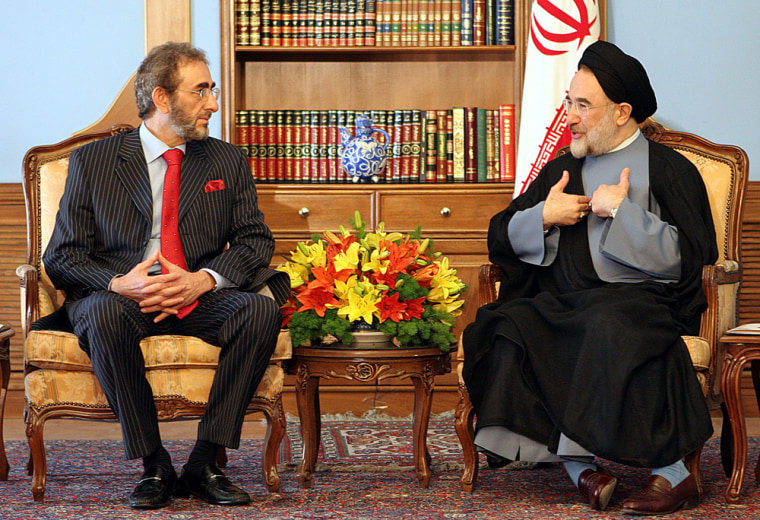Iraq’s defense minister said Thursday that ousted leader Saddam Hussein was the aggressor in the 1980-88 war against Iran, as the two former enemies announced plans for closer cooperation between their militaries.
Iraqi Defense Minister Saadoun al-Duleimi’s visit to Iran marked a new effort to build ties between Iraq and mainly Shiite Muslim Iran after a Shiite-dominated government came to power in Baghdad this year.
“We’ve come here to open a new page in our relations against the painful page of the past,” al-Duleimi told reporters at a press conference with his Iranian counterpart, Ali Shamkhani.
Shamkhani said Iran and Iraq would form joint committees to work out cooperation on cleaning minefields and “modernizing Iraq’s army.”
“No one can prevent this cooperation,” Shamkhani insisted, without elaborating on the extent of the cooperation.
The United States — Iran’s No. 1 enemy — is helping build Iraq’s military and security forces and would likely oppose any Iranian intervention.
But the warm talk reflected the sympathies toward Tehran from the new Baghdad government, where several parties long tied to Iran hold sway.
Old aggression blamed on Saddam
Al-Duleimi on Thursday promised that Iraq would no longer be a threat to its neighbors and he acknowledged that Saddam’s regime was responsible for starting the bloody 1980-88 war against Iran, in which one million people died.
He pointed to the “painful past that led to the victimization of many people from both nations by Saddam.”
“Our Iranian brothers have overcome the pains caused by Saddam, but our nation is still suffering from the unfair decisions by Saddam,” he said.
Saddam, who was captured in December 2003, is facing a wide range of charges including killing his opponents, gassing Kurds, invading Kuwait in 1990 and suppressing Kurdish and Shiite uprisings against his rule in 1991. Iran has said it was preparing to file a lawsuit against Saddam for invading Iran.
Asked about $1 billion in war damages demanded by Iran for the 1980-88 war, al-Duleimi said, “We have come to our brothers in Iran and have demanded help.” He didn’t elaborate, but other Iraqi officials have reportedly called on Iran to waive the demand.
Warming relations result of new government
The comments from al-Duleimi — a Sunni Muslim, picked for the defense post in part in a bid to bring Iraq’s minority Sunnis behind the new government — were a sharp contrast to those of his predecessor.
Last year, former Iraqi Defense Minister Hazem Shaalan called Iran his country’s “first enemy,” accusing it of supporting Iraqi insurgents and allowing them to freely cross the border. Tehran says it is trying to control the border, but at nearly 1,000 miles long, the frontier is hard to police.
On Wednesday, the first day of al-Duleimi’s visit, Shamkhani demanded the Iraqi government push for the removal of American forces on its soil, saying their presence serves Israel’s interest.
“Iran demands that the Iraqi government make a decision on this case,” Shamkhani said. “The government and people of Iraq should not allow foreign forces to consolidate their control in the area with the aim of providing security for Israel.”
